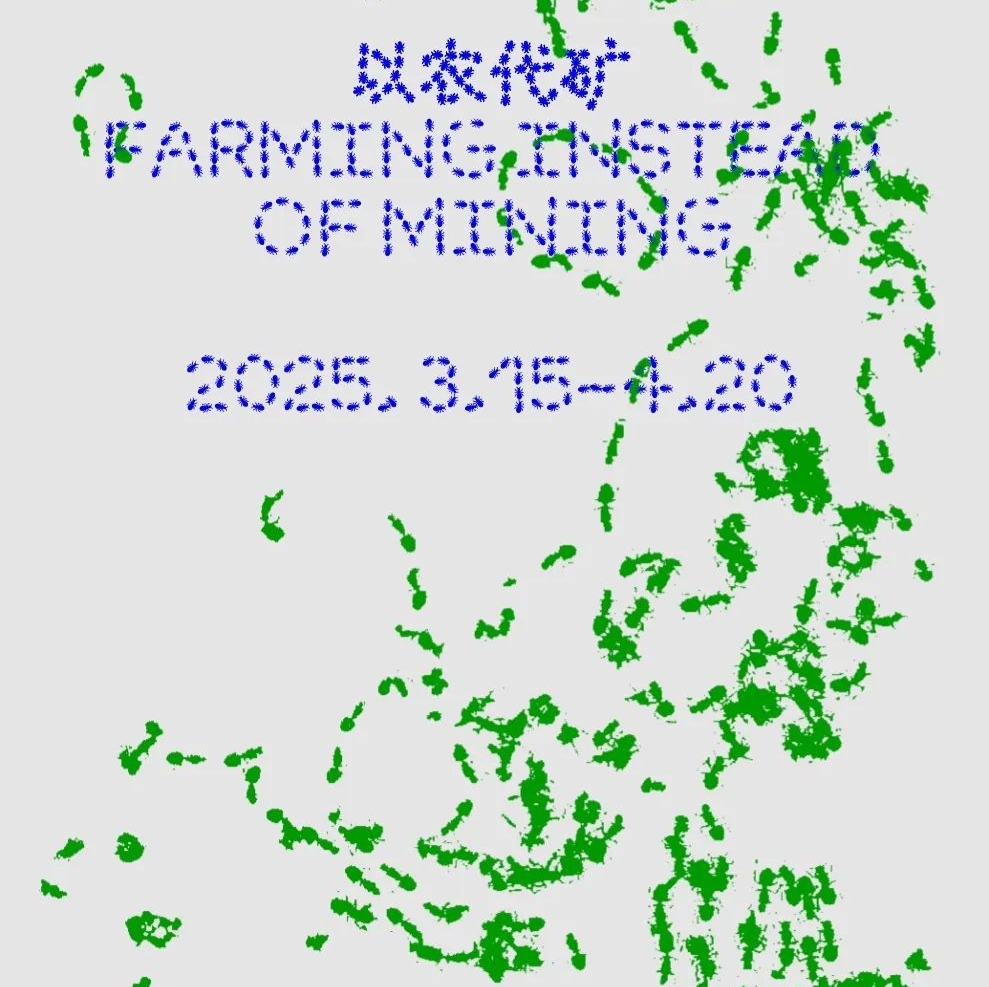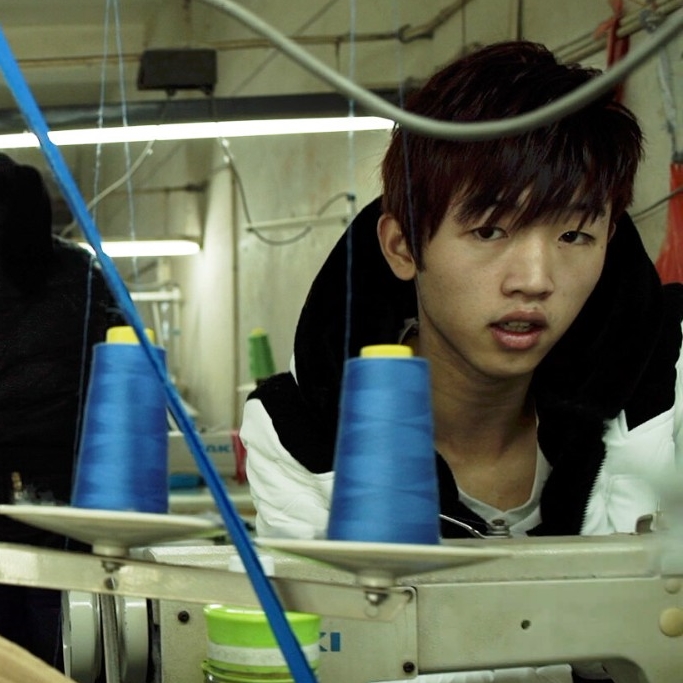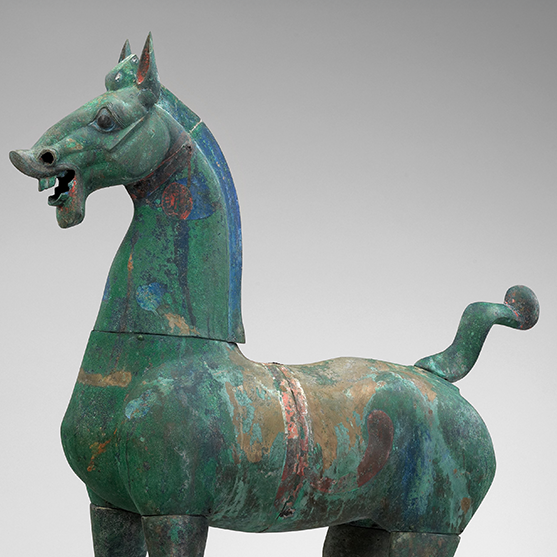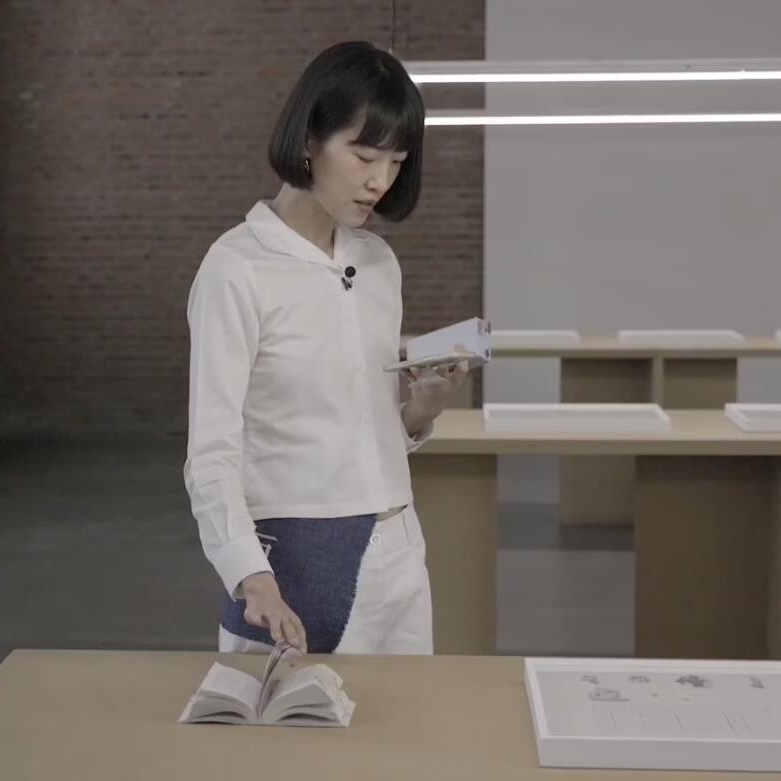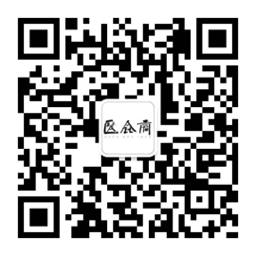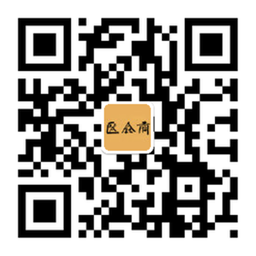
Xu Bing, detail of Gravitational Arena, 2023. Courtesy the artist.
Asia Society Texas (AST) presents Xu Bing: Word Alchemy featuring more than 50 of Xu Bing's most important woodcut prints, videos, drawings, installations, and other ephemera representing almost 50 years of the artist's creative output.
Starting with Xu's early engagements with social realism and Western art historical traditions alike, the exhibition charts the evolution of the artist's linguistic experiments that challenge and expand not only the history of Chinese landscape painting, but the canons of contemporary art. Xu Bing: Word Alchemy remains on view through Sunday, July 14, 2024.
Xu Bing is widely considered to be one of the most important artists working today. Focusing on the artist's longstanding engagement with words and language, Word Alchemy is the most comprehensive exhibition on this theme so far, and around one-third of the objects in the exhibition are being shown in the U.S. for the first time. “Xu Bing: Word Alchemy is a journey through Xu Bing's interwoven strands of his visual-linguistic imagination and Chinese cultural history. His exploration continually looks forward, incorporating new technologies and his own unique creativity to stimulate and challenge us to think in new and unconventional ways" says Susan L. Beningson, Ph.D., co-curator of the exhibition.

Xu Bing, Magic Carpet, 2006. Hand weaved carpet. Courtesy of the artist.
According to Owen Duffy, Ph.D., Nancy C. Allen Curator and Director, “Xu Bing: Word Alchemy is the artist's most expansive exhibition to date about words and language. The artist consistently challenges our preconceived notions about how we use language to navigate the world, offering pioneering works of contemporary art that delight and confound. Our world is richer because of his art."

Xu Bing, Background Story: Autumn Colors on the Qiao and Hua Mountains, 2023. Natural debris attached to frosted glass, wood, lights. Courtesy the artist.
In addition to more than 15 works never-before seen in the United States, Xu Bing: Word Alchemy features several new commissions and site-specific installations by Xu Bing. Specific highlights of this exhibition include the debut of a new Background Story work, where the artist recreates, out of debris, a famous Chinese landscape painting as a larger-than-life illuminated installation. In this Background Story, Xu Bing brings to life Zhao Mengfu’s famous Autumn Colors on the Qiao and Hua Mountains (1295) handscroll, and, for the first time, the artist will enhance the Background Story with animated projections that show the addition of colophons, seals, and inscriptions over the centuries.

Exhibition View of Background Story: Autumn Colors on the Qiao and Hua Mountains, 2023.
In the Fayez Sarofim Grand Hall, Xu Bing unveiled a new version of Monkeys Grasp for the Moon. Here, suspended over a mirror, a 20-foot string of lacquered primates hangs from the ceiling, and a grouping hangs on the wall nearby. Each of the 21 pieces is composed of the word “monkey,” spelled out calligraphically in a different language: English, Thai, Arabic, and so on. The work references a Chinese folktale in which monkeys, observing the moon's reflection in a pool of water and worried that the moon had fallen, attempt to "grasp" the lunar orb, only to realize what they see is an illusion.


Exhibition View of Monkeys Grasp for the Moon
Finally, Xu Bing has created a new Square Word Calligraphy piece, where the artist transforms English words to assume the form of Chinese characters – that reinterprets the legendary folk song Deep in the Heart of Texas by Don Swander and June Hershey. Through this new work, Xu Bing graces Texas with this ode to the state's unofficial anthem, passionately sung at events throughout the Lone Star State.


Exhibition View of Square Word Calligraphy: Deep in the Heart of Texas
"If my art made with words is still effective, I think it's because words are often seen as cultural representatives,” says Xu Bing. “Their task is to divide and categorize the complex world and record it as knowledge concepts. The core purpose of art is to use some means that have not been turned into knowledge, fresh, irregular, to loosen and blur the knowledge order arranged by language. My works can be seen as: using the form of language, touching the part that language itselfcannot express."

Xu Bing, Mustard Seed Landscape Scroll (detail), 2010, mixed media. Image courtesy of the artist. Xu Bing, Book from the Ground (Pop Up Book), 2015-2016, specialty paper with non-acid latex. Image courtesy of the artist.
Xu Bing, Book from the Ground (Pop Up Book), 2015-2016, specialty paper with non-acid latex. Image courtesy of the artist.
On the occasion of the exhibition, Asia Society Texas published a full-color exhibition catalogue and host a symposium on Xu Bing's art on February 23, 2024.
Xu Bing: Word Alchemy Fast Facts:
. Dates: Thursday, February 22, 2024 – Sunday, July 14, 2024
. Opening Reception with the artist: Thursday, February 22 from 6 p.m. – 8 p.m.
. Exhibition Admission: Free for members, $5 for students and seniors with I.D., and $8 for nonmembers. Free Thursdays presented by Regions Bank.
. Hours: Wednesday, Friday–Sunday, 10 a.m. – 5 p.m.; Thursdays 12 p.m. – 7 p.m.
. Location: Asia Society Texas, 1370 Southmore Blvd, Houston, TX, 77004 (in the Museum District)
About the Artist
Xu Bing was born in Chongqing, China, in 1955 and raised in Beijing. He enrolled in the Printmaking Department of the Central Academy of Fine Arts in Beijing in 1977, completed his studies in 1981, and later joined the faculty. He went on to earn a master's degree from the same institution in 1987. In recognition of his accomplishments, he was invited to the United States as an honorary artist in 1990. Xu Bing's career has been marked by a variety of notable achievements. In 2007, he returned to China and assumed several leadership roles at the Central Academy of Fine Arts, including Vice President, professor, and supervisor of doctoral students. Since 2014, he has served as the head of the institution's Academic Committee. Currently, he divides his time between Beijing and New York, where he lives and works.
Xu Bing's work has been displayed in numerous prestigious venues around the world, including the Museum of Modern Art and the Metropolitan Museum of Art in New York, the Guggenheim Museum, and the Sackler National Gallery in Washington, D.C. His work has also been exhibited at the British Museum, the Victoria and Albert Museum, and the Museo Reina Sofia, as well as the Joan Miró Foundation. Additionally, he has participated in several international exhibitions, including the Venice Biennale, Sydney Biennale, São Paulo Biennale, and Johannesburg Biennale.
His works are included in major art history textbooks such as Art Past, Art Present (Boston: Abrahams Inc, 1997) and Gardner’s Art Through the Ages: A Global History (Wadsworth: Cengage Learning, 2013).
Xu Bing has been the recipient of several esteemed awards throughout his illustrious career. In 1999, he was granted the MacArthur Fellowship for his exceptional originality, creativity, personal direction, and significant contributions to society, particularly in the domains of printmaking and calligraphy. In 2003, he was honored with the 14th Fukuoka Asian Cultural Award in Japan for his noteworthy contribution to the advancement of Asian culture. In his acceptance speech, Okwui Enwezor lauded Xu Bing as an artist who transcends cultural boundaries, bridging the divide between East and West and expressing his thoughts and realities in a visual language. Additionally, he won the first Artes Mundi Prize in Wales in 2004, and the lifetime achievement award from the Southern Graphics Council in 2006. In 2010, Columbia University awarded him an honorary Doctorate of Humane Letters, while in 2015, he received the Andrew D. White Professor-at-Large from Cornell University and the Medal ofArts from the U.S. Department of State.
About Asia Society Texas Center
Asia Society Texas Center believes in the strength and beauty of diverse perspectives and people. As an educational institution, we advance cultural exchange by celebrating the vibrant diversity of Asia, inspiring empathy, and fostering a better understanding ofour interconnected world. Spanning the fields ofarts, business, culture, education, and policy, our programming is rooted in the educational and cultural development ofour community — trusting in the power of art, dialogue, and ideas to combat bias and build a more inclusive society.
Courtesy of Asia Society Texas and Xu Bing Studio.


